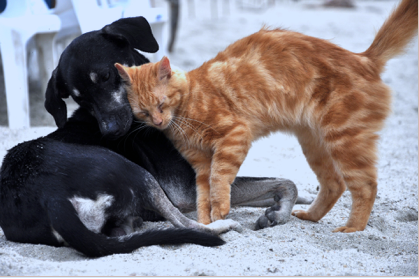If you’ve spent any amount of time online, then you’ve likely seen a beautiful story about a senior pet finally getting adopted by her forever family after living at a shelter. You might admire those people from afar and think to yourself, “I could never do that. I wouldn’t want to say goodbye after only a few years.”
But who says that those few years can’t be the best years of your life (and surely the best years of your pet’s life)? You could watch any video of a dog that spent years at a shelter going home with a family, and there wouldn’t be a dry eye in the house. There’s joy in owning a pet at all stages of their lives, from the tiny kitten or puppy stage to the end of the road. An older pet might even be the perfect fit for you right now. Whether you’ve been a pet owner for a long time or you’re making the loving decision to open your home to a senior pet, here are some things to consider for their care.
Health Changes
Cats and dogs typically enter into their senior years between the ages of 5 and 10. Larger dogs have shorter lifespans, so their senior years begin earlier, while cats have longer lives and can stay youthful for a decade or more.
Animals start showing signs of aging when their fur begins to gray. However, as their chins begin to become snowcapped, their insides are also aging. Older pets are at a greater risk of developing cancer, diabetes, and other organ diseases. They can develop cataracts and other sight issues, hearing loss, arthritis, and hip dysplasia. They are not much different from humans and the issues that fall on us as we age. The difference between us and our pets is that their issues come sooner and they’re unable to help themselves. They rely on us — their owners — to keep them healthy.
Behavior Changes
Pain and the loss of senses can often lead to changes in behavior among senior pets. A once-energetic pet may become slower and more subdued. A once-athletic dog might not have the strength to go on long walks. Your pet might sleep more, play less, eat less, or become easily disoriented. When you start to notice that your cat or dog is acting abnormally and experiencing cognitive decline, then it’s time to make a vet appointment to see what’s happening inside.
Some pets can suffer from depression later in life, and while it’s not a certainty, it’s definitely a possibility. If you find that your dog needs something to boost her mood on days when you are at work, consider bringing in a pet sitter to come in to spend some time with your animal friend. Your pet will likely welcome the company.
Pets who are up in years also tend to have issues with “accidents” around the home. Although these can cause unpleasant stains and odors, it’s important to remain patient and calm with your buddy; after all, they can’t help it! Having cleaning supplies on hand to help with the cleaning process is always a good idea, though you might need the assistance of professionals to ensure your house stays fresh. Fortunately, carpet cleaners aren’t too expensive.
Providing Comfort
Senior pets need special attention and accessories to make their lives more comfortable. Older dogs don’t need long walks, but they do need to get outside to smell the world and use the bathroom. If your dog has trouble walking, consider buying a stroller so he can enjoy the outdoors without risk of injury. If he has trouble getting to his favorite spot on the sofa or into your car, you can give him easier access by picking up some pet stairs. If your cat is aging, then a heated bed could keep her warm (you can find heated beds through retailers such as Chewy starting at around $14). Of course, it’s always wise to review them before you make a purchase, as the options are numerous!
Geriatric animals may also have different nutrient requirements, which you can meet by switching their food. Older dogs could use more protein to combat muscle waste, less fat, and more omega-3 fatty acids. Like older dogs, senior cats need more protein to make up for muscle loss. A higher calorie diet may also be required to maintain a healthy weight during your pet’s golden years.
Furrever Family
Many new pet owners prefer a younger pet because they want to spend as much time together as possible, but adopting a senior pet will change both of your lives for the better. Geriatric animals can also be easier to live with because they are calmer, trained, and grateful to be home with you. They become companions for life — you forever in theirs, and they forever in your hearts.
It doesn’t matter how old your pet is. He is still the same pure soul that you adopted many years or months ago. His love for you is still unconditional, and his need for you is still undeniable. Without you, he would have nothing to live for. Make your last years together unforgettable and remarkable.
Photo Credit: Pixabay




